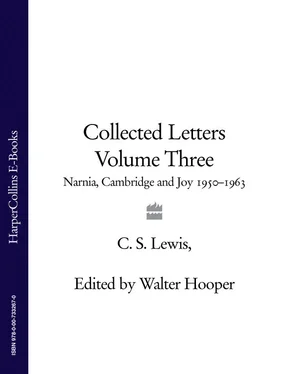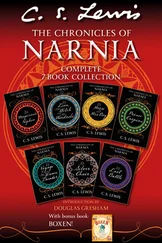Yours,
C. S. Lewis
I’d love to see a bear, a snow-shoe, and a real forest
TO GEOFFREY BLES (BOD):
Magdalen College
Oxford
Nov 12th 53
My dear Bles
Right-oh. I’ll take the £17-0-0 and expect to have £8-10-0 Royalties deducted.
I can’t tell you how glad I am that you spotted that howler about the frying pan and the fire. I wonder no hostile reviewer seized on it. 217
Yours
C. S. Lewis
TO MARY WILLIS SHELBURNE (W):
Magdalen College
Oxford
27/xi/53
Dear Mrs. Shelburne
Thank you for your letter of Nov. 23rd. We have a good many things in common at the moment, for I also am dead tired (cab-horse tired) and I also have sinusitis. I don’t think we exactly ‘call it catarrh’ over here. Intense catarrh is one symptom of sinusitis, and as none of us have heard of s. till quite lately I suppose cases of it used to be wrongly diagnosed as mere catarrh. I find myself that when it produces most catarrh it produces least pain and vice versa.
About sleep: do you find that the great secret (if one can do it) is not to care whether you sleep? Sleep is a jade who scorns her suitors but woos her scorners.
I feel exactly as you do about the horrid commercial racket they have made out of Christmas. I send no cards and give no presents except to children.
It is fun to see you agreeing with what you believe to be my views on prayer: well you may, for they are not mine but scriptural. Our prayers are God talking to Himself’ is only Romans, VII, 26-27. 218 And ‘praying to the end’ is of course our old acquaintance, the parable of the Unjust Judge. 219
I am sure you will be glad to hear that your recent adventures have been a great support and ‘corroboration’ to me. I am also v. conscious (and was especially so while praying for you during your workless time) that anxiety is not only a pain wh. we must ask God to assuage but also a weakness we must ask Him to pardon–for He’s told us take no care for the morrow. The news that you had been almost miraculously guarded from that sin and spared that pain and hence the good hope that we shall all find the like mercy when our bad times come, has strengthened me much. God bless you.
Yours
C. S. Lewis
TO MARY VAN DEUSEN (W):
Magdalen College
Oxford
Nov 28th 1953
Dear Mrs. Van Deusen–
Your letter links onto something I’ve been thinking of lately. There are two patterns of prayer in the N.T. (a) That in Gethsemane, ‘Not my will but thine’ 220 (b) That in Mark xi, 24. 221
In the one the pray-er sees that what is asked may not be God’s will: in the other he has complete faith not only ‘in God’ but in God’s giving him the particular thing asked for. If both are taken as universal rules we get a contradiction for no one (so far as I can see) cd. follow both in the same prayer.
I can only suppose that neither is a universal rule, that each has its place, and that when-and-if God demands faith of the B type, He also gives it, & we shall know that we have to pray in the b manner, and that this is what happens to miracle workers.
If your Rector is such a person then he is right in praying that way himself, tho’ presumably wrong in demanding that everyone shd. do the same. If he is a presumptuous person who thinks he is in the A [B?] class and isn’t–well, that is not for us to judge.
As to whether God ever wills suffering, I think he is confused. We must distinguish in God, and even in ourselves, absolute will from relative will. No one absolutely wills to have a tooth out, but many will to have a tooth out rather than to go on with toothache. Surely in the same way God never absolutely wills the least suffering for any creature, but may will it rather than some alternative: e.g. He willed the crucifixion rather than that Man shd. go unredeemed (and so it was not , in all senses, His will that the cup shd. pass from His Son).
That’s how I see the theoretical side of the thing. As for the practical-oh dear, oh dear! I certainly can’t conceive any less suitable preparation for Holy Communion than a Discussion or any grosser abuse of language than to call a Discussion a ‘meditation’. I think you and you only can decide whether it’s your job to ‘lead’ a study group or not.
As for the ‘blasting’ sermon no doubt the type blasted is an evil one. Is there good evidence that the preacher meant you to be included in that type? It does sometimes happen that utterances intended to be general are given particular application by the hearers. If it really was addressed to you, then no doubt you must just try to forgive it (as you have done) and otherwise do nothing about it.
The Bishop sounds a good one and I don’t see how you can go wrong in following his orders. He will know much better than I cd. at what point the frustrations and the risk of loss of charity (in oneself or others) occasioned by your parochial activities begin to outweigh the probabilities of usefulness. What a coil it all is: so much so that (as in graver matters) only by putting the will of God first & other considerations nowhere can one have peace. So glad to hear that all goes well with the young people. Love to all.
Yours
C. S. Lewis
TO MRS D. JESSUP (W):
Magdalen College,
Oxford.
Dec 1st 1953
Dear Mrs. Jessup
I am so glad to hear that certain mountains have shrunk to molehills. As to the problem of Thomas Merton versus C.W, E.U., G.M., 222 and C.S.L.:–
A . There are two meanings of World in N.T. (i) In ‘God so loved the World’ 223 it means the Creation–stars, trees, beasts, men, and angels, (ii) In ‘Love not the World’ 224 it means the ‘worldly’ life, i.e. the life built up by men in disregard of God, the life of money-making, ambition, snobbery, social success and ‘greatness’.
B. Most spiritual writers distinguish two vocations for Christians (i.) The monastic or contemplative life, (ii) The secular or active life. All Christians are called to abandon the ‘World’ (sense ii) in spirit, i.e. to reject as strongly as they possibly can its standards, motives, and prizes. But some are called to ‘come out of it’ 225 as far as possible by renouncing private property, marriage, their professions etc: others have to remain ‘in it’ but not ‘of it’.
I of course am in the second class and write for those who are also in it. This isn’t to say that I may not be (you may be sure I am) far too much ‘of it’. You, and your friend, must help me against that with your prayers. In so far as she accuses me of ‘worldliness’ she is right: but if by ‘earthiness’ she means my tendency to ‘come down to brass tacks’ and try to deal with the ordinary petty sins & virtues of secular & domestic life, she is wrong. That is a thing that ought to be done and has not yet been done enough.
About avoiding amusements & noise, it depends a bit who one is. Is the temptation to be absorbed by them? Then avoid. Is the temptation to avoid them thro’ distaste when charity bids one to participate? Then participate. At least that’s how I see it.
Yours
C. S. Lewis
TO VERA GEBBERT (W): TS192/53.
Magdalen College,
Oxford.
1st December 1953.
Dear Mrs. Gebbert,
Many thanks for your kind letter of the 20th. November, which should have been answered sooner, but I am very behindhand, owing to the illness of my brother (nothing serious, and now happily over); but of course his absence always delays matters. He sends you all good wishes, and promises you a letter as soon as he has got himself ‘sorted out’. We both look forward with that schoolboy greediness which distinguishes the post-war Englishman, to the arrival of the little parcel, which we are sure will be of the standard which we have learnt to associate with the House of Gebbert. You shall indeed have a copy of the CHAIR, suitably autographed, 226 and I only wish I could make you some better return for all your kindness to us.
Читать дальше












